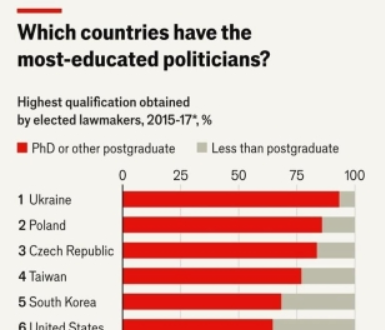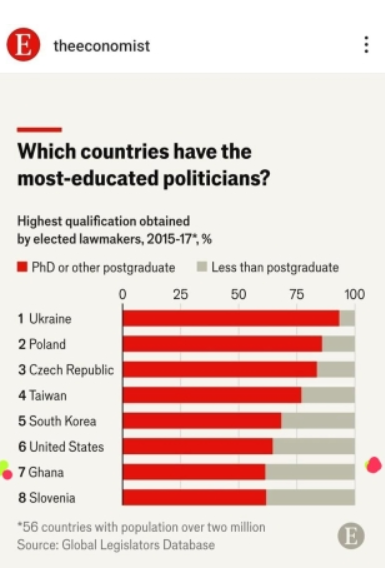Ghana ranks seventh in a list of countries with most educated politicians. An article that explores which countries have the most educated politicians has indicated.
The article is based on two studies conducted by researchers from global universities using data from 2015, 2017, and 2023.
This is from a Global Legislators Database that looked at 56 countries with populations over two million.
It shows the highest qualification obtained by elected lawmakers from 2015 to 2017 in percentage terms from PhD or other postgraduate degrees to less than postgraduate.
On top of the list is Ukraine followed by Poland in second position and Czech Republic in third position.
Taiwan follows in fourth position followed by South Korea in fifth position.
The United States is in sixth position followed by Ghana in seventh position and then Slovenia in eighth position.
The report was published by The Economist.
For years, political scientists have been comparing the types of people elected to national parliaments.
They find it relatively easy to track the average age of elected representatives (currently 51 globally) and the proportion of women (still only 27%).
They have had more difficulty examining how other characteristics differ among politicians in various countries.
However, two datasets published in October and November help address this.
These datasets enable scientists to compare the education levels of elected politicians.
The first study, compiled by researchers from six universities, gathered biographical data on nearly 20.000 parliamentarians from 97 countries between 2015 and 2017.
It is the most comprehensive study to date. Since the path to politics changes little even when governments do, the data likely reflects the current reality.
The study found that, on average, 78% of parliamentarians held at least a bachelor’s degree and 40% had postgraduate degrees.
These figures are far above the global average education level among the general population (currently 35% in wealthy countries and 15% in poorer ones). The ranking below includes 56 countries with populations over two million and data covering at least 90% of legislators.
Ukraine had the highest proportion of legislators with postgraduate degrees; nearly a quarter held a doctorate when the data was collected.
Academic titles have long been beneficial in Ukrainian politics: all its presidents since independence in 1991, except for Volodymyr Zelenskyy, claimed to hold doctoral degrees.
Even the younger, more diverse parliament elected in 2019 included a similar share of representatives with doctorates.
Other countries with highly credentialed legislators include South Korea, where nearly a third hold doctorates, and the United States (U.S.), where more than two-thirds have postgraduate degrees.
By contrast, countries like Italy, Norway, and the United Kingdom (UK) have a high proportion of parliamentarians with only secondary education.
For example, Sir Lindsay Hoyle became Speaker of the UK House of Commons without attending university.
Luigi Di Maio and Matteo Salvini, anti-establishment politicians in Italy, also dropped out of university.
Second study
The second study, conducted by researchers in Chile, examined a sample of 6.000 legislators from nearly 30 countries in 2023.
It found that in North and Latin America, law graduates tend to form the largest blocs in national legislatures.
Meanwhile, Nordic countries lean towards politicians with backgrounds in social sciences, such as economics.
The UK stands out for electing an unusually high number of legislators whose highest degrees are in arts and humanities, such as history or classics.
Can voters in countries where politicians have numerous academic credentials expect their leaders to perform better than average? There is little empirical evidence to support this.
A 2015 study examined the performance of U.S. Congress members over the 20th century and found that those with college degrees did not serve longer, pass more legislation, or win reelection more often than those without degrees.
A more recent study in Spain revealed that mayors with degrees were no better than others at reducing unemployment, balancing budgets, or attracting new residents to their cities.
Countries that fill their parliaments with lawyers do not necessarily enjoy significantly stronger rule of law, according to the research.
Moreover, globally, the most educated politicians lose elections at about the same rate as candidates with less formal education.
Nonetheless, it is becoming increasingly difficult for individuals without degrees to get their names on the ballot.
National legislatures, at least in terms of education, have become less reflective of the populations they are supposed to represent. This trend could have unfortunate consequences.
Those who attain unusually expensive educations often have different priorities from the “average” person.
Citizens are less likely to vote if they do not see people like themselves on the ballot. While parliaments worldwide are gradually becoming younger and slightly more gender-balanced, they are also becoming more elite, Klix.ba writes.
THANK YOU for constantly reading stories on MyGhanaMedia.com, a news publishing website from Ghana. Kindly like, follow, comment, and SHARE stories on all social media platforms for more entertaining updates!
Follow us on Twitter: https://twitter.com/
Source: Graphic.com.gh
There are four types of content published on MyGhanaMedia.com daily: curated content; syndicated content; user-generated content; and original content.
 MYGHANAMEDIA.COM Best Source Of Latest News
MYGHANAMEDIA.COM Best Source Of Latest News






